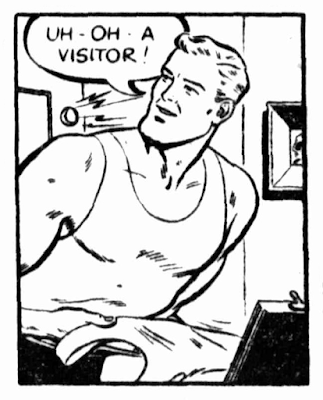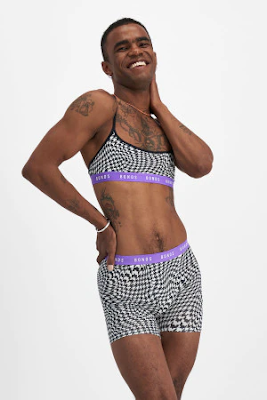Bonds is an iconic brand in Australia. Established in 1915, Bonds established their appeal through a very successful advertising campaign for a men's singlet that was launched in 1940. They created a character, Chesty Bond, who was envisaged to be a strong Australian man, kind, likeable and good looking, who would perform heroic deeds when wearing his Bonds singlet. The Chesty Bond comic strip character, although an advert, became very popular and by 1972 100 million singlets had been sold.
 |
| Chesty Bond |
Fast forward to 2023 and Bonds has changed its tune. It is now determined to be a "genderfree" company, offering a "genderless shopping experience" to its customers in order to be more inclusive. Bonds has announced that it will undertake a "comprehensive audit of all gendered terms used across product, packaging, and stores to challenge their relevance". But perhaps the key statement was made by Bonds marketing manager Kedda Ghazarian:
When gender norms are broken, everyone can feel free to be themselves.
This comment shows just how significant liberal autonomy theory still is in modern Western societies. The idea is that we are free when we are self-determining and self-defining autonomous individuals. Our sex is something predetermined rather than self-determined and is therefore considered a negative limitation on the individual, one that we have to be liberated from.
And so we go from Chesty Bond to our new "liberated" Australian men:
Quite some journey! From a Chesty Bond singlet to a bra.
Man is an incarnate being endowed with a mind capable of reason and will. Our body is a source of meaning; it expresses the person, "my body is me." To deny the body, to deny the influence of the sexed body on behaviour, interests, psychology, skills, not only contradicts numerous scientific studies, but is to deny that the human person is an embodied being and to make of it a pure spirit, a being which only defines itself.
We are born male or female and all our life we fulfil ourselves as man or woman, we become what we are in completing what we received at birth (nature), and by what we receive throughout our lives through culture (relationship to the father and the mother, education, history, language, customs...)
If what we received from the culture was completely separated from our bodies, we would not be united, as we would be torn between the meaning carried by our body, and what we received. This would create serious psychological disorders, a despair of not knowing who we are.
The autonomous self will not tolerate having its options limited by anything it did not choose – not even its own body.
We can call this view liberalism, employing a definition by the self-described liberal philosopher Peter Berkowitz. In his words, liberal thinkers focus on “dimensions of life previously regarded as fixed by nature” and seek to show that in reality they are “subject to human will and remaking.” For liberals, even your identity as male or female is now open to "human will and remaking."
This radical autonomy may be promoted as liberation, but it is a devastatingly disrespectful view of the physical body. The implication is that your body is not part of your authentic self.
…Of course, humans are more than biological beings. But biology gives an objective, scientifically detectable baseline for human identity.
When disconnected from biology, gender identity becomes subjective and ultimately unknowable.
...It treats the body as nothing but a piece of matter that gives people no clue about who they are as persons. It is a self-alienating worldview that teaches people that their identity as male or female has no inherent purpose or dignity.
We cannot ever be liberated from our sex because the attempt to do so disembodies the nature of our self and therefore disintegrates who we are - it cleaves body and self.
When it comes to our sex, the point is not to be liberated but, instead, to successfully fulfil our potential and our purposes as men and women. Where "gender norms" help us to do this they play a positive role in culture and should be encouraged.


No comments:
Post a Comment